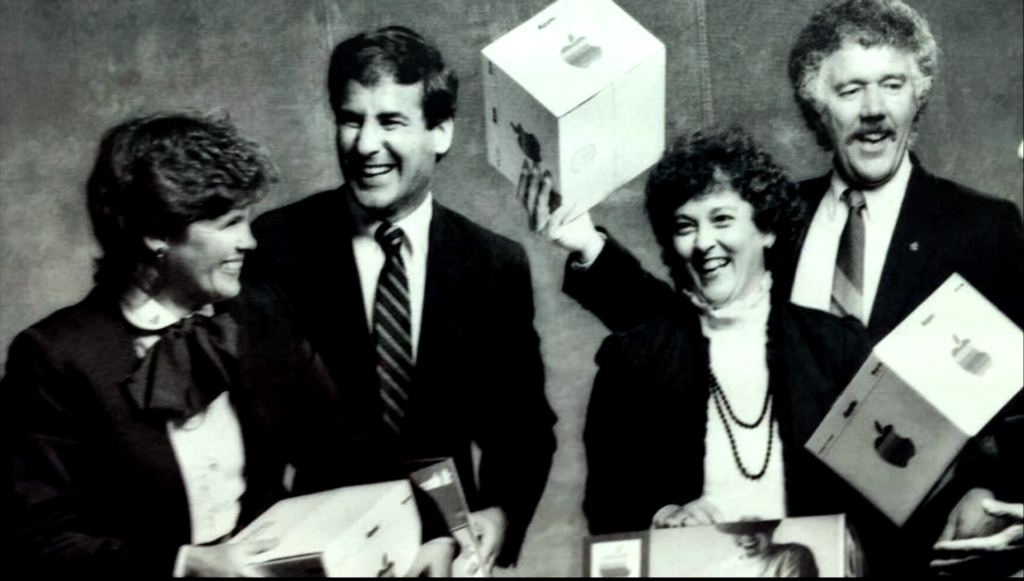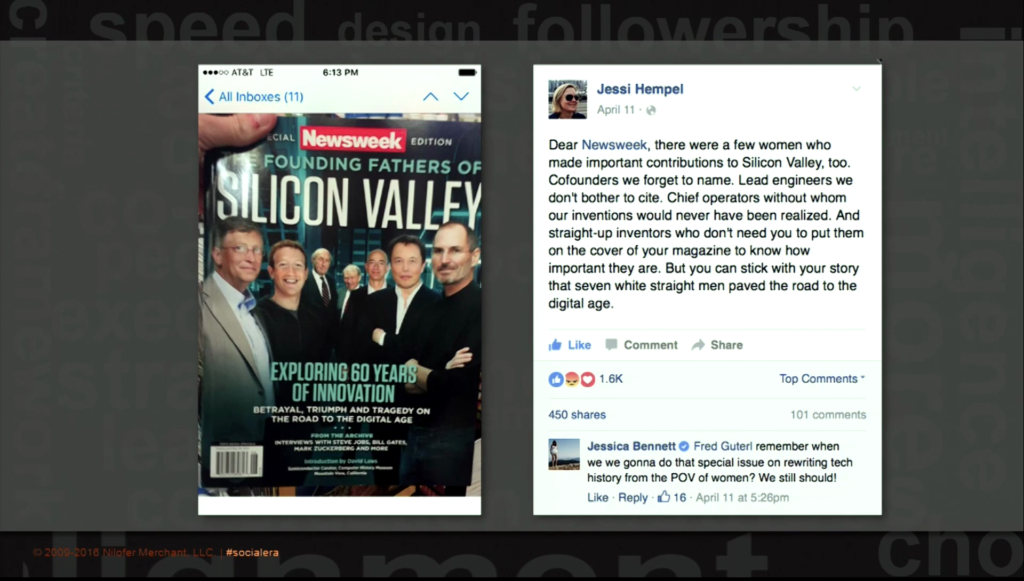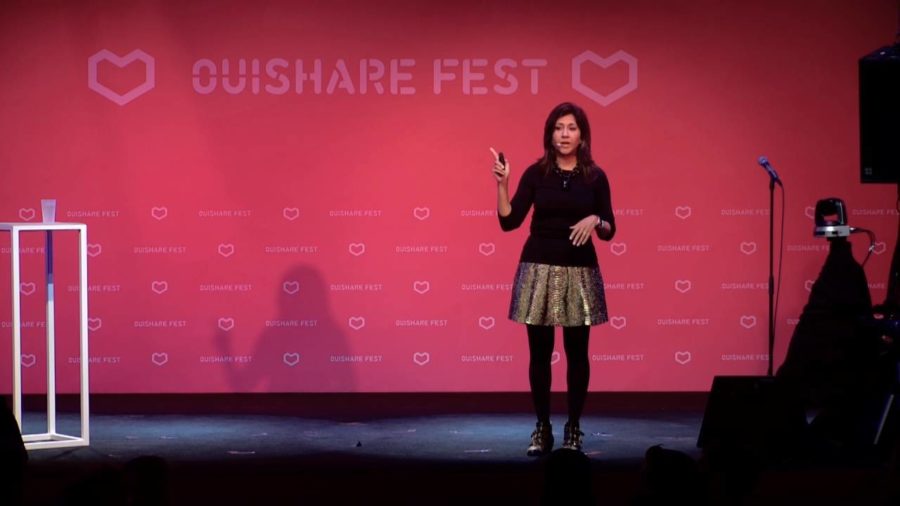Nilofer Merchant: Bonjour à tous. Good morning, everyone. [speaks briefly in broken French] See, now I’m going to prove my point. [More slowly in French again] …je ne parles bien en français, as you saw.
So I’m going to return to English. And even though I’ve lived here for two years I really wish I was stronger in French. Because it would be so lovely to be able to talk with you more in your native tongue, too.
But as Antonin said, I moved to Paris about two years ago and it’s been actually a remarkable couple of years. I’ve got a chance to meet quite a few entrepreneurs who live here and throughout Europe. And what has fascinated me is in the backdrop of all the things that have gone on here, from Nuit debout to to Charlie Hebdo, how many people are looking for the innovation of Silicon Valley to be part of the solution.
And as I’ve been getting ready to actually return back to Silicon Valley after two years I’ve got this feeling in my gut that something is terribly wrong if Europe adopts Silicon Valley’s metaphor for success. And Antonin and I have been talking about it for quite a while, and so he suggested actually that I share that with you.
So I’m not giving my standard talk. You can Google talks I’ve already given on collaboration to thousands of people and see that, because that’s content’s there. We thought we would do something really special for this moment and time, for what is it that Europe can do differently to actually use the model.
Now, if said generously you could say that what I’m about to talk about are myths that Silicon Valley sells to the rest the world. If you’re talking about it a little bit more harshly you might call them lies—whichever you choose. In fact what I want to just do is ask you to share with me what you think some of the stories are that are coming out of Silicon Valley, and I’m going to give you a chance to do that. And as that starts I thought I would just share some headlines I found in the last few days.
So what do you see? White men! Good one. What else? Steve Jobs saved the company. Yeah. You guys are going to have to be a little louder. Heroes. Religion? Silicon Valley as religion. There you go. Shiny tech.
Well, you guys exactly got to where I wanted to go, so thank you for that. I’m going to share with you what I think are three. And the big theme you just caught on is the hero, the crown. I think one of the things we do is we say, “Hey, find a big idea. Be the one to do it. And then garner all the revenue from it.” And in doing so we actually put a crown on the head. They’re all interlinked myths, though. So if you don’t understand all three, you might accept some of it as being valid, and then we end up in a place we actually don’t want to be.
So the first one is the “find a big idea” piece, sometimes people call it the unicorn. And I’m actually working on a book while I’m here—that’s one of the projects I’ve been doing—and studied over 300 entrepreneurs and people who are really making a huge dent in the world. And in learning their stories, one of the things that came up over and over again is how much their original efforts started off as a side-project. And for several years, in fact, was something that they didn’t even think was going to go anywhere. Eighty percent of the stories were little side-projects that for one, two, three years, they just kinda kept chasing almost because they couldn’t stop chasing it? And then it ended up growing because they found something that…pulled them into the future.
And so when we accept the mythology of “find a big idea,” I think the thing we actually deny is the idea that matters to us. And so if we’re looking for the million-dollar, billion-dollar, trillion-dollar idea, what about the thing that’s in pain right next to us that we actually can notice and do something about? We might ignore that.
And in fact every company that we celebrate today, I’m sort of amazed at how much we don’t understand the backstory. Google, which is one of the biggest companies in the world today, and certainly a giant, actually started off for many years in a lab at Stanford. They were called Backrub. They were going to license their technology. And that was it. They were done. Earn money, good, bye.
And it grew and grew for what they actually thought was really interesting, which was how do you connect a bunch of other people’s references instead of what a company wanted to promote? So if I linked to you because I thought the idea was good, that’s what was more interesting than an advertising kind of model.
So the truth is that original ideas don’t actually start out as big. They become big by what you do. First by what you notice, and then what you’re willing to act on.
The second one is the one that we just pointed out of singular heroes. And in that set of pictures, also white men. So, here’s the funny part is we do this thing where we talk about the founders of Google. And we ignore the other part of the story.
So, the person who actually did the license deal that actually drove the first seven years of Google’s revenue model was a Hispanic woman. She doesn’t show up in the majority of the stories that are ever told about Google.

I worked at Apple early on in my career. I actually picked apricots in the orchards that Apple’s buildings were built on. Apple is one of the first companies I worked at. I ended up going there to many other web-related companies. And this is the Apple of my experience. It had a lot of difference in it, certainly not as many people of color as I would like, but at least it had women. And yet those women have been wiped out of the story entirely.

And as you noticed in the Newsweek cover story, which they called the “fathers” of innovation, there are no women. There are no people of color. They’ve just completely obfuscated that. And a friend of mine who happens to be also a writer pointed out that sure, sure Newsweek, you can go ahead and say that but that means that you’re ignoring the CFO that made the company valid. You’re ignoring the CEO that made Facebook profitable. You’re ignoring all the engineers and business people who came alongside those teams.
So the actual truth of the story is that ideas may certainly be born of you, like in the Google case, but they grow through the power of us. And when we obfuscated that truth, then what we do is we ignore the people we need to build around us. We ignore the intimacy, as we talked about earlier this morning, that we need to have in order to trust one another in order to make an idea get bigger.
And the third one is a direct lineage of those other two myths, which is, “Hey if I’m the man, and I built it, then don’t I also get to take home and garner all the rewards from it?” Makes sense, right? If I’m the man on the front of the cover of the magazine, I’m the man.
And I think that’s actually the message that they believe, like truly truly believe. And yet what I find so funny even about people in San Francisco and in Silicon Valley is they’ll say you know, “I invented the Internet.” I’ve actually had people say that to me. “I’ve invented the Internet.”
I’m thinking you know, DARPA actually invented all the protocols that you have just figured out how to build on top of. SRI actually built a bunch of the technology that companies now use today. And those companies were funded by government money. So no one “invented” the Internet all by themselves. And what that does, though, is that you can say, “Hey man I’m it. You can ignore everyone else.” And this should worry us greatly.
San Francisco pays for companies like Twitter to build buildings and asks them not to pay taxes. And yet all the streets of San Francisco are full of homeless people. You will going into a Starbucks to buy a cup of coffee and you will get chased in by a homeless person. It is not a pleasant experience, but those people are not doing it for torturing you, right. They’re doing it because they have no other place to go because the government has failed them. The system has failed them. And then people write articles saying, “I don’t want to deal with homeless riff-raff.” I as a tech person, who by the way am working on important things like the Internet, shouldn’t have to deal with that.
It is not— I wish I could say in this case the truth was different. But I’m going to have to name this a wish more than a truth. In US we do this thing of celebrating individualism, Silicon Valley especially. And they don’t understand the plurality of how we actually get things done. So in French language I think about this as the vous, not the tu. The vous, not the you.
So at all times, vous is about both this idea of respect. So I will address someone more formally with a vous, so it’s a sign of respect. But it is also a sign of the plurality. So I can use the same word. And this is what I think is the best thing about the European culture. And if you accept what Silicon Valley sells, you’re denying your absolute strength and what will actually make it wonderful for you to do innovation here, but in your own way. In a more connected and collaborative way.
So I want to just wrap with this idea. Let’s find a new way to be. A new how. Certainly not the Silicon Valley way. Because that is just a story that will end up with us leaving what is our strength. Instead of simply enriching the few, let’s find a way to build something even better, more about prosperity and less about wealth, so we can have a society and a community that benefits us all. Individually how we hold ourselves so we allow ourselves the benefit of the idea that matters to us. Building the community around us who will make that real—and I’m looking at a whole room of people who’ve made OuiShare real. And to actually figure out how to serve society, not to block it off and sit in a bus far away from it.
So that’s what I wanted to come and share with you this morning, and I hope it’s useful for this community. And we’re also going to be around to have conversations for the rest the day, and so I hope you guys will help me take this set of myths and trash them, and maybe figure out ways that we can actually find a way to move it into reality. How’s that? Merci.
